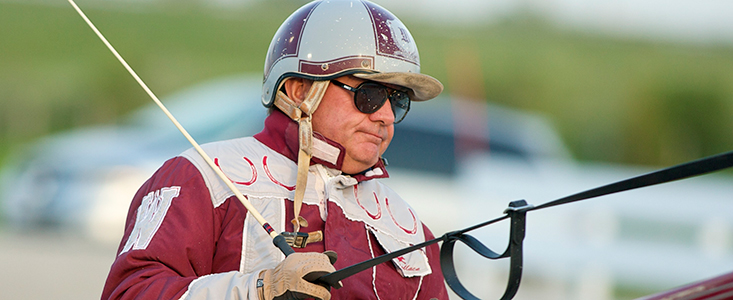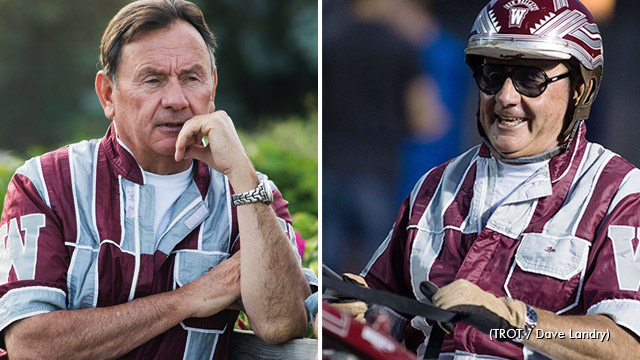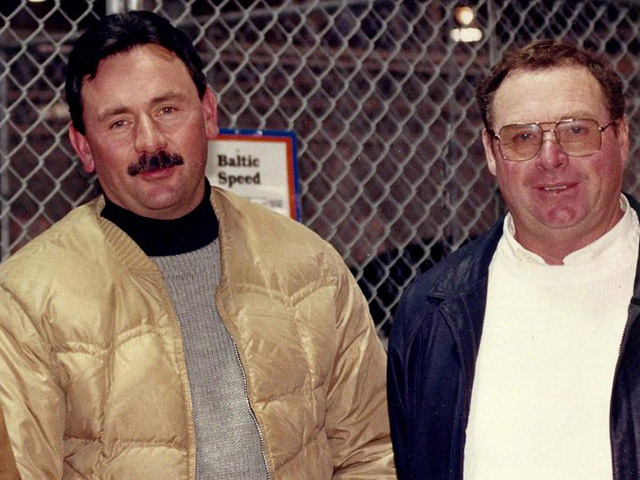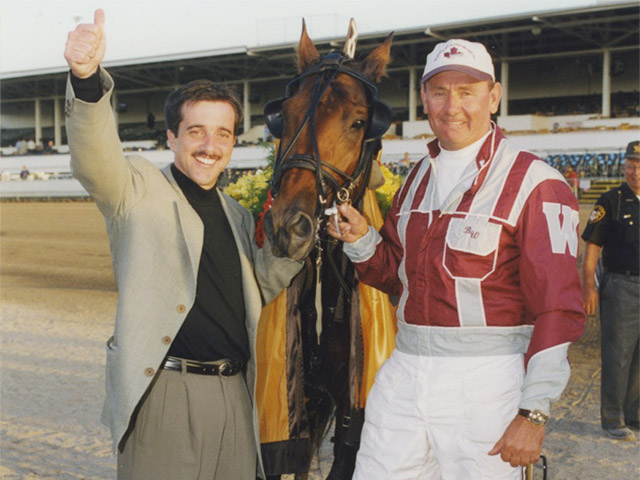Not having grown up in the business, Ben Wallace laughed when his first employer told him that if he lasted through that first winter living in a tack room in the backstretch of Buffalo Raceway, that he’d be in this game forever.
Now, approximately 50 years later, the man who truly cherishes all of the people he’s met along the way, steps into the Canadian Horse Racing Hall Of Fame. By Dan Fisher.

“When I got the call that I was getting inducted I didn’t say much because I was a little tied up on it for sure, but the first thing that really came into my mind when I hung the phone up was all the people that I’ve come across in this game in the last 50 years - I mean from the backstretch at Buffalo Raceway to the backstretches of Mohawk and Greenwood and wherever. And obviously the horses… they always gave you reason to fantasize about what might happen or to swell up from watching a replay, but you always forget the sheer number of individuals… of the people that you’ve crossed paths with. That’s one thing that this industry always offers, such an eclectic group of people that you don’t get an opportunity to… I definitely factor that into my love for this game - the people. Absolutely it’s the people without a doubt. When I think about being a Hall Of Famer I think about the people that were embedded with me along the way that all helped make it happen.”
Ben Wallace isn’t shy to reminisce and share his stories of the people that have come and gone from his life as a Hall Of Fame Standardbred trainer, even though all of the stories he tells can’t necessarily be put into print.
He’s also not shy to give credit to those who helped him the most, but is firm in his belief that if you want to be successful in this industry it’s incumbent on oneself to pay attention and ask questions. “When I worked for people like Keith Waples and Garth [Gordon] they didn’t lead you around by the hand and show you everything. When I was in the vicinity of people like them, or Ronnie Feagan or Cowboy Curran, whether it was in the shedrow or a tack room or wherever, I kept my mouth shut and I listened. I was in awe of those people and I treated them that way. I’m not totally certain, and I’m not calling anyone out specifically, but I don’t know that I see that same level of respect from today’s younger generation.”
So how was it that the young man born and raised in Guelph, Ontario came to know and admire these great horsemen of the 1960’s and ‘70’s? Maybe he grew up in a family of horsepeople? “My family wasn’t involved in racing at all,” Wallace shares. “My Dad was an absolute lover of horses though - he just had a very deep admiration of them. He’d go to the track with his good friend just to see them and watch them race. He wasn’t a gambler… I don’t know that he ever made a bet, but he loved horses. I didn’t go with him though - I was too busy at Exhibition Park in Guelph playing basketball and football and baseball.
“After high school ended about six of us good buddies decided to go to Europe. It was 1968 and it was just on the cusp of when that ‘Europe on five dollars a day’ thing started being the thing to do. I remember how we were all at the train station in Guelph and I had a bag and I had $400 in my pocket and we were going… it was pretty hardcore. We went for a whole year, and then we came back and we all went to university. I went to the University of Windsor and I played football there. Originally I was in the Honours Phys-Ed program but I wasn’t too good at making it to the 8:30am Wrestling class,” Wallace laughs, “so I did a general Bachelor of Arts with a major in Geography and a minor in Urban Planning… I thought that I might go in the direction of urban planning I guess.
“When we all graduated a few years later, the other guys all went back to Europe - I wasn’t doing that. I was a pretty good baseball player and I was playing for Guelph in that Senior Inter-County League. A guy who was coaching us and playing too went by the name of Walt Jeffries… he had a bunch of horses racing in Buffalo and suggested I come down and see them go, so I went along to check it out. I thought it looked pretty interesting so I got a job there at the track working for Bill Lambertus. It was November, and I was living in a tack room in the backstretch of Buffalo Raceway making $45 a week. It was pretty much the asshole of the world. Bill told me that if I lasted through that first winter that I’d be in the game for life. I laughed because I thought it was just something that would be fun for a while and then I’d move on… but I guess he was right in the end. All I knew at the time was that I had money in my pocket, a $400 Ford Falcon, and draught beer was only 15 cents - life was pretty good.”

When the Buffalo meet ended in the spring Wallace found himself out of work, but still unsure of whether he was looking to make racing a career or not, he wandered into the Mohawk backstretch one morning. “The first barn you came to there was Barn #1 - Keith Waples was stabled right there. I was pretty sure I wasn’t even good enough to work at the Jockey Club at that point… the OJC was a BIG deal. But I had heard that Keith Waples was paying $61/week. I had only been making $45 so I thought I’d go see how long this had been going on for,” he laughs. “I got the job working for Keith, and what a hall of fame shedrow that was. Ronnie [Waples] was just in the process of leaving to set up his own stable in Windsor. Tom Strauss and Clarence Gagnon were his trainers, then as you went down the shedrow John Burns rubbed on the first four, then Keith Clark, who has won everything there is to win out west, had four, Tap Dean had four and Barry Drury had four. What a great crew he had. Clarence [Gagnon] hired me - he said that Tapper [Dean] hadn’t been in for two or three days,” Ben laughs heartily. “He said that they figured he was either drunk or in jail so I might as well start rubbing on his four.”
After about a year-and-a-half with Waples it was on to a job with more responsibilities working for Garth Gordon. “Garth really did a lot for me in terms of getting my name out there. He drove them all on the Jockey Club but he let me ship them and drive them even, at places like Kawartha… I started getting known a bit more when I started driving some and that really did a lot for me. I learned a lot working for both Keith and for Garth… there’s really a plethora of great people in this business, and if you get yourself aligned with any of them and make the effort to learn what they’re offering, you have a great chance to succeed. There’s some deadbeats too, like anywhere else, and if you get in with them and stay then you’ll probably become a deadbeat too, or you’ll just end up doing something else, but there really are a lot of great people in this industry.
After approximately 18 months with Garth, it would be the next place of employment however, that made the biggest impact on the young trainer’s career. “Tom Artandi came to me one day - he was Bill Wellwood’s top man and they were stabled on the other side of the shedrow from us. He told me that he was going out on his own and that Bill had a lot of interest in his job from other people. Tom told me that I probably had a good chance to get the job but that I should really go talk to Bill and put my name in. I knew that Woody was a really sharp old guy and that maybe he had liked what he had seen from me, but I said to Artandi, ‘If he likes me can’t he stick his head around the corner of the bath rack one day and just say something?’ Tom insisted that wouldn’t happen and that I should really put my name in, but I didn’t do it. Then one night, I remember it like it was yesterday, I was heading back to the stable area from the track at Mohawk and Woody came by in his truck. He slowed down and looked at me and said, ‘Come and see me tomorrow morning.’ I did, and he hired me. I gave Garth two weeks notice and went to work for Woody.

“What an incredible human being that man was. Everything that you’ve ever heard, every accolade, every compliment - it’s all warranted and then some. He would just make some decisions that seemed like they came out of nowhere and they’d always work out. He knew horses but he knew people too. He was just as good a handler of people as he was with horses - maybe even better. Today’s game is so different, especially when it comes to communication… with social media, and videos, and texting, and email. He was a smart guy so I’m sure he would have adapted, but part of what made him so good is that he was so good with people. Back then it wasn’t all statistics and computers… if you wanted to know something you had to go and talk to the man, and he was the man. He was so good at dealing with people - I swear that he could mother-f&%k a guy right to his face and ten minutes later the guy was buying him a drink,” Wallace fondly recalls with a chuckle. And even though this interview is taking place via telephone in this COVID-19 world, the smile on Ben Wallace’s face shines right through the telephone line as he tells the tales of his mentor.
“Through my partner Renee [Kierans] I met the Thoroughbred hall-of-fame trainer, Reade Baker, in Florida a few years back. We went to dinner at their place and he wouldn’t have known me from Adam… and even if he did, he had no idea of my connection to Bill Wellwood. He was telling me how years ago whenever there may have been trouble with contract negotiations between the Standardbred guys and the OJC, the Thoroughbred guys would get pretty nervous because they needed us racing over the winter to keep the money coming in. He reminisced about some very spirited negotiations he was involved in over the years with the OJC, OHHA and the HBPA. Then he says, ‘There was this red-faced guy named Wild-something, or Wood.’ I said ‘Bill Wellwood.’ He says, ‘Yes, that’s it! That guy was always great to have there - he didn’t mess around. One day I swear he reached right over the table and grabbed one of the OJC guys right by the shirt. If it wasn’t for guys like him, that Bill Wellwood fella, we would have been in a lot of trouble.’ I laughed so hard - and I knew that Woody would sometimes have a few rum and cokes before those meetings and had heard some stories (laughing). But I got a real kick out of hearing that,” Wallace shares, “because I knew exactly what Mr. Baker was talking about.
“One thing Woody really did for me was he let me make mistakes and learn from them. He never really told me what to do. I got to drive all of the entries when I was there, and in those days there were a lot of betting entries [#1 and #1A, etc]. I swear that in all the years I was there, and it was almost seven years, he never once told me how to drive one. I know that the gamblers and the public always thought that the guys driving the entries would have a plan, and try to gang up on the other horses. Not once did Bill Wellwood ever tell me how to drive an entry. He gave me shit quite a few times afterwards, if I screwed up, but he never told me how to drive.”
One day Wallace was approached by an NHL defenseman about coming to train horses for him on a private contract. “I eventually left Woody and went out on my own because Scott Campbell of the Winnipeg Jets offered to pay me $25,000 a year plus 10% of what the stable made to come and train for him - I was making $15,000/year at that time. I told Woody about the offer, and it killed me. I loved him. I absolutely loved that man, and he knew I did. He said to me, ‘I can’t afford to lose you, but I can’t afford to keep you either.’ And then very prophetically he said, ‘You can’t turn this guy down, but the two of you will be out of business in a year.’” Wallace laughs again at the wisdom of Bill Wellwood.
“It was almost a year to the day that Campbell called me up and told me he was retiring from hockey. He said that he had exercised-induced asthma that was making it too difficult, but that he had a very good summer gambling on the horses and that everything would be fine. At that moment I knew that we were done - his hockey income was gone and he was a big gambler. Although things lasted a little longer than a year, it turned out that Woody was right. Luckily Scott had let me keep one horse on the side, that he didn’t own… it was a horse that belonged to Gar Morritt, by the name of Flowing Harry. He wasn’t a bad horse and within another year or so I think that I was up to about 20 horses, so it all worked out.”
Work out it did. In 1996 the Ben Wallace stable earned more than $1 million in purses for the first time, as it would do for 17 straight years to follow. 1999 was the year that Wallace gained fame across North America when his own Blissfull Hall would capture pacing’s Triple Crown. The highs in wins and money both came in 2002 when the stable captured 151 races and earned more than $4.5 million in purses. All-tolled Ben has now won 1,947 races and more than $38 million in purses.
“You know, we did have a really good run for a while there, but we had a lot of fun too. I was training one for a really prominent owner in the business there for a few months one time, but had never met them. I was in New York and met them for dinner one night. We were having a nice conversation and the woman says to me, ‘You know we probably would have given you horses to train years ago but we heard you were a real drinker.’ I politely said to her, ‘Ma’am, where I come from if you can’t sit down and have a beer or two after the races, you’re probably not going to have any horses in your stable,’” Ben laughs. “Maybe the drinking and having fun didn’t always help my career - I probably acted like an idiot a few times - but we always had fun. Racing horses wasn’t always just about return-on-investment… there was a social aspect to it as well,” the trainer shares.
“Looking back though, I do really want to mention three main groups here that I couldn’t have gotten to the hall of fame without. The first is Marv Chantler and Tony Aarts. I mention them together as one because they were best friends and owned a lot of horses together, and they were the first ones to bring me up from being an overnight trainer when we had Armbro Rosebud. She won a bunch of [OSS] Golds and was second in the Breeders Crown… she won an O’Brien. I was happy being an overnight trainer up until then, and not being from a family that was in racing I didn’t even really know about the O’Brien Awards. She changed all that. Then we tripped over Camotion and he made almost $2 million for us. Those guys were great guys and they really helped put me on the map.

“The next guy was Daniel Plouffe. He and I bought Blissfull together and he showed that not only could I play at the highest level, but I could be successful there too. Daniel Plouffe is the easiest man to train for in the world… he never argued with what we were saying or doing, he was always very supportive. We had a great run for a number of years and we’re still very good friends to this day.
“In the latter years of my career it’s been Brad Grant. Brad is the greatest guy in the world to train a horse for. He’s as good an owner as he is a person and he’s just a great person. We’ve had some good luck and had a few good horses together but he’s one guy that I really wish I could have found a world champion for. He’s in on a bunch of them down there now in Tony Alagna’s program too, and I really hope he hits that home run.
When asked to share any other short stories that pop into his head from some of the ‘eclectic people’ he’s met over the years, Wallace obliges.
“People in this business can just be so good-hearted. I’ll never forget the time I decided to supplement Pronger into the Breeders Crown, with my own money. It was about $50,000 U.S. and it was a big gamble, but he had won a heat of the Jug and showed that he could go with them. The cheque had to be in the race office by 10am the morning of the draw and Dave Reid of Preferred Equine was going to drop it off for me at The Meadowlands. He called me about 9:45am - he was stuck in bad traffic and he wasn’t going to make it. I had a few horses stabled at The Meadowlands then and Bruce MacDonald was there for me… I called him in the barn and said, ‘Who is our neighbour in the barn?’ I hadn’t even been down yet. He said that it was Robbie Siegelman and I said, ‘Put him on the phone.’ When Rob answered I said, ‘Hi, I’m your neighbour, Ben Wallace. I know we’ve never met but do you think that you can write the Hambletonian Society a cheque for $50,000 for me and have it in the race office in the next 10 minutes?’ He did it. That’s the kind of people we have in this game. It’s amazing.”
EDITOR’S NOTE: Pronger won his Crown elimination and went off at 5/2 in the final, but got parked hard, first-over, by No Pan Intended and faded to 6th.
“The other story that stands out and always makes me laugh is a Ron Pierce story,” Wallace chuckles. “When Ronnie was first at The Meadowlands, the story goes that Billy O’Donnell just used to torture him. He’d always tease Ronnie that he was never going to make it as a driver… kind of like a veteran hockey player torturing a rookie in the locker room. O’Donnell was ruthless with him for years, and it must have really gotten to him. So in 1999 he’s driving Blissfull for us. We win the Cane at Freehold, the Jug in a race-off, and in mid-October we take the Messenger in two straight heats at The Meadows. We just won the damn Triple Crown and you know the first thing Ronnie says when he comes back to the winner’s circle? He says, ‘Do you think O’Donnell thinks I’ll make it as a driver now?’ I still laugh every time I think of that.”
The people he’s met along the way. That sure seems to be where the conversation keeps going with the new hall of famer, as he reflects on his 50 or so years in the business. And nothing really sums that up, at both ends of the spectrum, like the story he shares from his teaching days at Seneca College.
“I taught the Standardbred course at Seneca College for five years back when they offered it. I still kept a small stable with two employees at the time as I had weekends and holidays off, as well as the summer. One year in the late spring I sat up on the stage at the graduation ceremony, waiting to hand the students their diplomas. I was seated right next to the longtime Premier of Ontario, Bill Davis. He was a great guy… super guy to talk with. We chatted all afternoon. That night I raced two at Greenwood - I don’t remember who they were but they were no good. After the races I sat on an upside down paddock pail, all wet, in a tack room in the backstretch of Greenwood Raceway, with ‘Fancy’ Dolson, drinking rye and coke out of a coke can (laughing). I’ll tell you, there aren’t many industries where you can be fortunate enough to have made acquaintances with that wide a range of good people.”
Congratulations on your induction to the Canadian Horse Racing Hall Of Fame Ben!



Buffalo Raceway and Batavia
Buffalo Raceway and Batavia Downs were not the best tracks in North America, but some great horsemen spent time there, including Ron's father Donny Pierce, Michel Lachance, Buddy Gilmour and Jack Kopas.
Longevity is almost as
Longevity is almost as impressive as the man himself. Congratulations Ben! You've come along ways since Black is Beautiful!
Congratulations Ben; Great
Congratulations Ben;
Great career and much deserved success - such a great read.